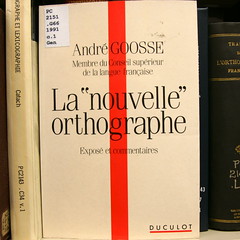Jun
2011
Assistive tech for all second language learners

exposé by romana klee on Flickr
As a Core French teacher, I want my students to develop second language learning strategies that will translate into being able to think critically and communicate their ideas effectively in a foreign language context. This includes spelling – which can be a challenge even to native French speakers.
Despite trying to follow best practices, my students’ final work is often peppered with spelling errors that compromise its readability or message. Often they write short simple sentences with less creativity so as to produce work with fewer errors.
Fast-forward to a day this Spring when I walked in to our computer lab while one of our Assistive Technology coaches was demonstrating how to use WordQ. WordQ is a software that works over other programs, such as Word and internet Explorer, and predicts what word you might be trying to type. It gives you options, which narrow as you keep typing and when you select a option, it will read it to you. What’s more, is that it comes in French and is very easy to use.
Although we only prescribe the use of such software to students with Individual Education Plans, I started thinking about using it for all students in my grade 5/6 Core French class. Should using such software (for students who do not have learning disabilities) be considered cheating? Do they need to be able to spell French words independently?
Upon reflection I realized the following:
- I teach in my second language yet almost never write in it by hand
- when using a word processor, I right-click any misspelled words to see the spelling suggestions
- the word-prediction feature of WordQ is similar to texting software and texting is an authentic way that my students might communicate in written French in the future
- word prediction software is NOT a translation tool so the students are still thinking and writing in their second language
- by having the words read to them, they are honing their auditory discrimination abilities
- by seeing and hearing six or seven similar words in one go, they are making the connection between speech and spelling patterns and getting a visual reminder to use a word that ends in a plural suffix (which would not necessarily be pronounced in French), if that is their intended meaning
In my first assignment in which I encouraged the use of WordQ, this is what I noticed:
- my students wrote more
- everyone worked in the computer lab (i.e. typing French was not “too hard”)
- everyone handed in their assignment within two days of the deadline
- and, most importantly, the students were proud to have their work displayed in our school hallways (even knowing that they would be seen by their French immersion counterparts)
So, is proper spelling still important? Umm, yeah. But I think that my ideas on how to get there are evolving.